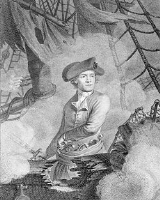
John Paul Jones
John Paul Jones was a Scottish-born naval officer who was America's first well-known naval hero during its Revolutionary War, and later served in the Imperial Russian Navy.
Sourced
- I wish to have no connection with any ship that does not sail fast; for I intend to go in harm's way.
- Letter to Le Ray de Chaumont (16 November 1778), as quoted in The Naval History of the United States (1890) by Willis John Abbot, p. 82
- I have not yet begun to fight!
- His famous response, in the early phase of the Battle of Flamborough Head, (23 September 1779) to an inquiry by his opponent (Captain Richard Pearson of the Royal Navy ship HMS Serapis) as to whether he was surrendering his ship, the USS Bonhomme Richard, as recounted in the reminiscences of Jones's First Lieutenant, Richard Dale, as published in The Life and Character of John Paul Jones, a Captain in the United States Navy (1825) by John Henry Sherburne:
-
- ...the Bon Homme Richard, having head way, ran her bows into the stern of the Serapis. We had remained in this situation but a few minutes when we were again hailed by the Serapis, "Has your ship struck?" To which Captain Jones answered, "I have not yet begun to fight!"
- In Naval teminology to "strike the colours" means to haul down the ship's flag to signify surrender, but here the use of the ship as subject of the sentence may imply a pun on the non-naval use of "struck".
- I may sink, but I'll be damned if I strike!
- His much less famous response, in the late phase of the Battle of Flamborough Head, 23 September 1779, to an inquiry by his opponent (Captain Richard Pearson of the Royal Navy ship HMS Serapis) as to whether he was surrendering his ship, the USS Bonhomme Richard, which was by this time very seriously damaged.
-
- This was what some of his sailors, reported in British newspapers at the time, claimed he had said; Jones's official report merely stated that he had answered "in the most determined negative".
- Where men of fine feeling are concerned there is seldom misunderstanding.
- Letter from Jones to the Marquis de Lafayette. May 1, 1779.
Unsourced
- An honorable Peace is and always was my first wish! I can take no delight in the effusion of human Blood; but, if this War should continue, I wish to have the most active part in it.
- If fear is cultivated it will become stronger, if faith is cultivated it will achieve mastery.
- It seems to be a law of nature, inflexible and inexorable, that those who will not risk cannot win.
- Sign on, young man, and sail with me. The stature of our homeland is no more than the measure of ourselves. Our job is to keep her free. Our will is to keep the torch of freedom burning for all. To this solemn purpose we call on the young, the brave, the strong, and the free. Heed my call, Come to the sea. Come Sail with me.
- Whoever can surprise well must Conquer.
Quotes about Jones
- The future naval officers, who live within these walls, will find in the career of the man whose life we this day celebrate, not merely a subject for admiration and respect, but an object lesson to be taken into their innermost hearts. . . . Every officer . . . should feel in each fiber of his being an eager desire to emulate the energy, the professional capacity, the indomitable determination and dauntless scorn of death which marked John Paul Jones above all his fellows.
- US President Theodore Roosevelt, in an address to The US Naval Academy, Annapolis (24 April 1906).
Misattributed
- That flag and I are twins, born in the same hour from the same womb of destiny. We cannot be parted in life or in death.
- This statement was attributed to Jones in a 1900 biography by Augustus C. Buell which contains much material now believed to have been fabricated by Buell.
- Variant: That flag and I are twins. We were born at the same hour. We cannot be parted in life or death. So long as we float, we shall float together.
- It is by no means enough that an officer of the Navy should be a capable mariner. He must be that, of course, but also a great deal more. He should be as well a gentleman of liberal education, refined manners, punctilious courtesy, and the nicest sense of personal honor.
He should be the soul of tact, patience, justice, firmness, kindness, and charity. No meritorious act of a subordinate should escape his attention or be left to pass without its reward, even if the reward is only a word of approval. Conversely, he should not be blind to a single fault in any subordinate, though at the same time, he should be quick and unfailing to distinguish error from malice, thoughtlessness from incompetency, and well meant shortcomings from heedless or stupid blunder.
In one word, every commander should keep constantly before him the great truth, that to be well obeyed, he must be perfectly esteemed.- Statement long attributed to Jones, but now believed to have been written by Augustus C. Buell. Reef Points: 2003-2004, 98th Edition, U.S. Naval Academy (2003)
